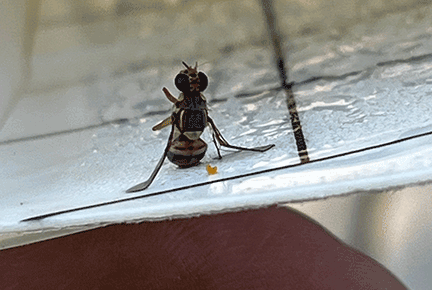Concord, CA – The Contra Costa County Agricultural Commissioner, in cooperation with the California Department of Food and Agriculture and the United States Department of Agriculture, has initiated an extensive survey and eradication plan in response to the detection of seven male oriental fruit flies, Bactrocera dorsalis, near the cities of Brentwood and Oakley in Contra Costa County.
The initial detection was confirmed on August 25, 2023. The detections were made as part of the department’s coordinated pest prevention system that protects the County’s agriculture and natural resources from invasive species with early detection as a key component to successfully eradicating an infestation before it can become established.
The extensive survey, also known as a delimitation survey, consists of multiple oriental fruit fly traps at prescribed densities placed in concentric circles going out 4.5 miles in each direction from the oriental fruit fly detection sites. Seven Oriental Fruit Flies will trigger a quarantine which will be announced shortly by the California Department of Food and Agriculture.
Following the principles of Integrated Pest Management (IPM), agricultural officials use “male attractant” technique as the mainstay of the eradication effort for this invasive species. This approach has successfully eliminated dozens of fruit fly infestations in California. Trained workers squirt a small patch of fruit fly attractant mixed with a very small dose of Spinosad, a natural pesticide made by soil bacterium and is approved for use on organic crops, approximately 8-10 feet off the ground on street trees and similar surfaces; male fruit flies are attracted to the mixture and perish after consuming it. The male attractant treatment program is being carried out over an area that extends 1.5 miles from each site where the oriental fruit flies were trapped.
While fruit flies and other invasive species that threaten California’s crops and natural environment are sometimes detected in agricultural areas, the vast majority are found in urban and suburban communities. The most common pathway for these pests to enter the state is by “hitchhiking” in fruits and vegetables brought back illegally by travelers as they return from infested regions of the world or from packages of home grown produce sent to California. Help protect California’s agricultural and natural resources; please Don’t Pack a Pest (www.dontpackapest.com) when traveling or mailing packages.
“Invasive non-native fruit flies are serious pests for California’s agricultural industry and backyard gardens,” said Contra Costa County Agricultural Commissioner Matt Slattengren. “These recent detections remind us that we need to remain vigilant in protecting our agricultural and natural resources. When traveling abroad or mailing packages to California, we urge the public not to bring back or ship fruits and vegetables as they are pathways for oriental fruit flies and other invasive species entering our state.”
The oriental fruit fly is known to target over 230 different fruit, vegetable, and plant commodities. Important California crops at risk include grapes, pome, stone fruits, citrus, dates, avocados, and many vegetables, particularly tomatoes and peppers. Damage occurs when the female fruit fly lays her eggs inside the fruit. The eggs hatch into maggots, which tunnel through the flesh of the fruit, making it unfit for consumption.
The oriental fruit fly is widespread throughout much of the mainland of southern Asia and neighboring islands, including Sri Lanka and Taiwan, and it has invaded other areas, most notably Africa and Hawaii.
Federal, state, and county agricultural officials work year-round, 365 days a year, to prevent, deter, detect, and eliminate the threat of invasive species and diseases that can damage or destroy our agricultural products and natural environment. The efforts are aimed at keeping California’s natural environment and food supply plentiful, safe, and pest-free.
Residents with questions about the project may call the Contra Costa County Agricultural Commissioner’s office at 925-608-6600 or the California Department of Food and Agriculture’s Pest Hotline at 1-800-491-1899.


2 comments
When you say quarantine…. wth does that mean???
In terms of a quarantine I would say that most of the actions will start with isolating agricultural activities and materials here in Contra Costa County. To start with this will probably involve a restriction on moving any fruit out of this County by individuals, such as those picking fruit in this area. Would have the potential of lots of orchards being affected next year.
There would most likely be a lot of attention directed at nurseries, with nursery stock having to be isolated or destroyed.
In terms of growers I could see them possibly having to strip fruit at times in an effort to deprive the fly from having sustenance and then having to spray the ground.
Could be wrong but I don’t think we’ll see the same level of activity we saw back in the early 80’s when we had inspection stations set up on 680 in San Ramon or fleets of helicopters sprating malathion once a week?
Comments are closed.